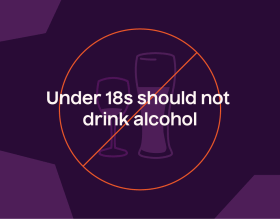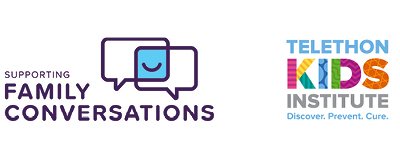
Impact of alcohol
Find out how alcohol can impact the developing brain and why young people under 18 should not drink alcohol.
You don’t have to be an expert, but think about what you want to say, and be ready to answer some difficult questions. Think about your beliefs about underage drinking, and what your child may ask and how you might respond.
Parents tell us starting the discussion when you’re both relaxed is helpful – like at the dinner table, when you’re driving them somewhere, or watching TV together.
It’s important your child knows the risks associated with alcohol but at the same time, if you use scare tactics, your child may dismiss what you are saying.
This lets your child know you are interested and helps maintain a close relationship.
Prepare for peer pressure to drink and how to respond.
What they are doing and who they are with. Get to know their friends, and friends’ parents, where possible.
That drinking is a normal part of growing up, and everyone starts drinking alcohol eventually. More young people are choosing to not drink than ever before.
Let your child see you refuse a drink and choose to have alcohol free days.

No amount of alcohol is safe for under 18s. The National Health and Medical Research Council recommends that children and people under 18 should not drink alcohol to reduce the risk of injury and other harms to health.
Parents can feel pressured to provide alcohol to their child. Being prepared with responses can make it easier to navigate tricky conversations. Here are some common questions/comments you might hear from your child, and some possible answers that may help you to say ‘no’.
You could say:
“I don’t have any say in what your friends do, but I love you and want to keep you safe. I don’t want you to drink until you are older. Perhaps we could think about what you could say if you are feeling pressured to drink when you don’t want to.”
“Actually, most children your age don’t drink, even if sometimes it feels like everyone is doing it.”
You could say:
“No, not even a sip. Your body and brain are still growing, and alcohol can harm your body and brain and cause you to do things that are unsafe. I don’t want you drinking alcohol at your age.”
The Australian Guidelines to Reduce Health Risks from Drinking Alcohol say that for children and young people under 18 years of age should not drink alcohol.
You could say:
“Yes, but I’m an adult. My body has stopped growing. Your body and brain are still developing and can be more affected by alcohol, so I’d like you to wait as long as possible before you try it. When you are an adult you can make your own decisions about whether or not you will drink.”
You could also discuss that even as an adult you have to consider how much you can drink and when you can do so. For parents who drink it’s important their children sometimes also see them choosing not to drink.
You could say:
“No, you know our family rules. No alcohol until you are over 18.”
Of course, this is much easier to say if you have had a conversation with your child and discussed your expectations about alcohol, and that you have developed some family rules.
You could say:
“I know you don’t want to feel the odd one out, but it’s my job to do what I think is best. I’m not happy about you being there with no adults when people are going to be drinking.”
Acknowledgement: Content on this webpage has been adapted from the Supporting Family Conversations Project under a license from the Telethon Kids Institute. The Supporting Family Conversations content was created in partnership with the Department of Education and Telethon Kids Institute with funding from Healthway.

Page last updated6 December 2023